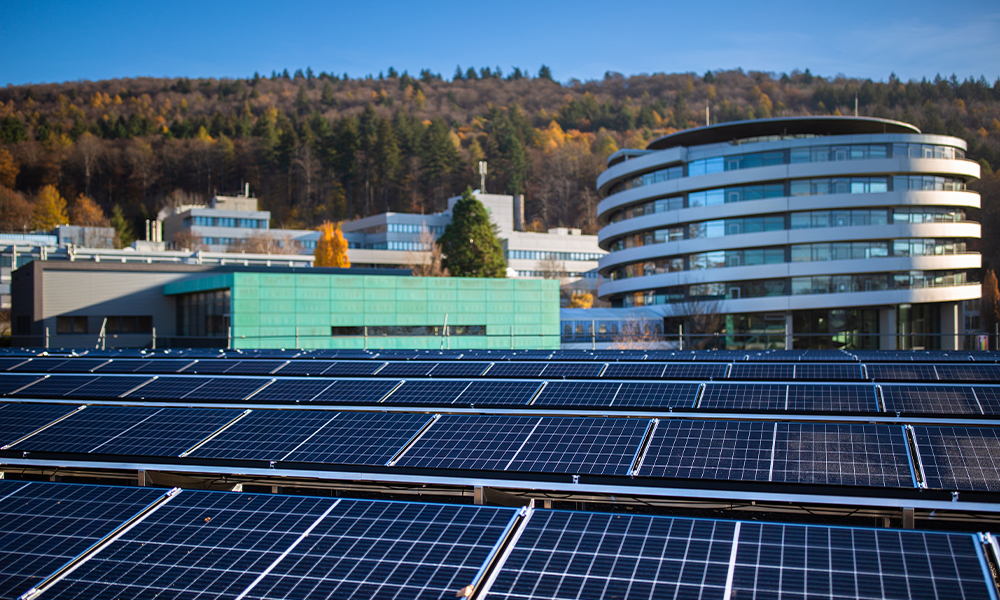EMBL's Environmental Officer Brendan Rouse explains more about his role as a European Climate Pact Ambassador.

EMBL's Environmental Officer, Brendan Rouse, has been selected as a European Climate Pact Ambassador. As the initiative gets started with its ambitious plans, Brendan explains what it means for EMBL and the organisation's commitment to a sustainable future.
What is the EU Climate Pact all about?
The European Climate Pact is an initiative that aims to get people and organisations involved in building a greener Europe. It's about connecting people and sharing knowledge, so that solutions can be scaled up to match the size of the challenge we're all facing.
The pact is working to inspire citizen participation across the EU, through events and pledges. As one example, individuals and organisations are invited to submit pledges to the pact in the form of science-based, concrete actions. They can be based on broad actions, or simply small sustainable choices. The background to all of this is the EU's Green Deal. That includes a focus on climate change policies within the EU, including a carbon reduction target of 55% by 2030.
All parts of society and the economy will need to play a role, and that means finding solutions that can work at scale for everything from power generation to agriculture to the building industry. Organisations like EMBL have an important part to play in all of this.
You've been chosen as a Climate Pact Ambassador - what does that mean?
The Climate Pact Ambassadors are a group of 181 people who have been selected to promote the pact and climate protection in general. Ambassadors are there to engage people and organisations who are not yet involved in climate action, and to support climate action within communities. They also act as a bridge between the European Commission and those organisations and individuals who are keen to get more involved.
As well as helping to organise activities related to climate change and environmental action, Climate Pact Ambassadors are expected to advocate within their communities. Part of this involves the sharing of reliable information on climate change, by developing online channels and raising awareness through media coverage, public discussions, and events.
What will it mean for EMBL?
I see our network as the community of European life science research organisations, and there's a great deal of potential in reaching out to them and trying to collectively raise our ambition. We're currently working on some ideas that will act as a blueprint for life science organisations, and will help with our outreach work to those organisations. Beyond that, I'm also keen to reach new audiences. Where there are any suitable events, we'll be using the Climate Pledge initiative to forge connections with those whom we aren't currently reaching. It's vital that this work runs through all aspects of the life sciences.
It's easy to feel overwhelmed by the scale of the challenge that climate change presents. How do you see the balance between individual actions and top-level policy changes, and how can individuals best make an impact?
The first thing I would say is that we can allow ourselves to be cautiously optimistic with regard to climate change. At a global scale, we have all the technology and knowledge needed to tackle the problem, and - crucially - economies are starting to swing towards sustainable economics. That's being demonstrated by plans like the EU's Green Deal, for example. What's still missing, though, is the required level of political intervention, as well as people taking personal responsibility for the impact that they're having.
Within a scientific organisation like EMBL, the onus on the individual to take responsibility is actually greater than in other workplaces. Our staff have more freedom to work how they see fit, and with that great freedom comes great responsibility. For example, our labs use a lot of energy, so it's really important that our staff turn things off when not needed, and that they use equipment responsibly.
Another area where we have choices to make is on the amount of travel we do as individuals. The current pandemic restrictions have brought our flight emissions down to near zero. Once those restrictions are lifted, I really hope that society doesn't go back to flying as much as it used to. We also have individual control of the goods we purchase, and here I believe old habits die hard. Being a responsible consumer of goods is really important. Identifying greener products and generating less waste by reusing things goes a long way to reducing an individual's ecological footprint.
I will continue to work with our leadership team, administration, and facilities, to ensure that we do our best to become a more sustainable science organisation. As individuals we must also all play our part.






